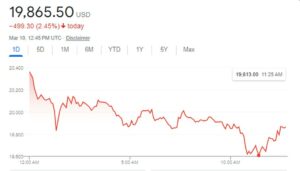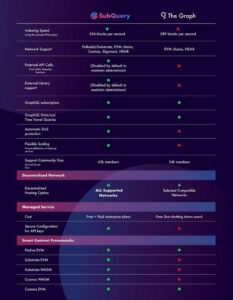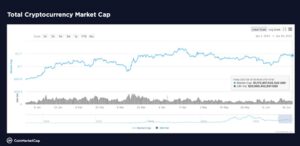
Yesterday, Ripple Labs Inc won its case against the U.S. Securities and Exchange Commission (SEC) after a U.S. judge ruled that the company “did not violate federal securities law” by selling its XRP token on public exchanges, setting a precedent for all cryptocurrency coins.
The Thursday court ruling marked a landmark legal triumph for Ripple Labs and had an immediate impact on the value of XRP. The cryptocurrency experienced a sharp surge in its valuation following the ruling, signaling a positive market response to the outcome of the case. The price of XRP was up by 75% at about 80 cents a coin by late afternoon on Thursday, according to data from Refinitiv Eikon and Coin Metrics.
XRP wasn’t the only cryptocurrency that saw a price increase due to the ruling. Bitcoin, the world’s most popular cryptocurrency, also saw a significant surge in price, reaching a nearly 13-month high. Investors warmly received the court ruling, which contributed to the price boost.
Earlier, Bitcoin soared to its highest level since June 2022, reaching a peak of $31,818. Although it slightly dipped afterward, it continued to trade around $31,235 as of 1349 GMT on Friday. This price movement indicates the positive sentiment among investors and their enthusiasm for the court ruling’s impact on the cryptocurrency market.
The ruling delivered by U.S. District Judge Analisa Torres marked a significant milestone as it became the first victory for a cryptocurrency company facing a case brought by the SEC. However, it is noteworthy that the SEC also achieved a partial victory in the ruling.
While the decision’s applicability is specific to the circumstances of this particular case, it is expected to provide support for other crypto firms engaged in legal battles with the SEC regarding the regulatory jurisdiction over their products.
An SEC spokesperson expressed satisfaction with a portion of the ruling that acknowledged Ripple’s violation of federal securities law through the direct sale of XRP to sophisticated investors. It’s also a possibility that the ruling could be appealed once a final judgment is issued or if the judge allows for it prior to that stage.
The SEC spokesperson confirmed that the regulator is currently reviewing the court’s decision. Ripple’s CEO, Brad Garlinghouse, expressed his enthusiasm for the ruling, describing it as a significant victory not only for Ripple but also for the broader cryptocurrency industry in the United States.
The good news for Ripple didn’t stop there. Coinbase, the largest cryptocurrency exchange in the U.S., announced its decision to reinstate XRP trading on its platform.
In a statement on Twitter, Coinbase’s chief legal officer, Paul Grewal, acknowledged the thoughtful decision made by Judge Torres and stated that after a thorough analysis, they have concluded that it is the right time to relist XRP on their platform.
“We’ve read Judge Torres’ thoughtful decision. We’ve carefully reviewed our analysis. It’s time to relist,” Grewal said in a tweet.
The Implication of the Ruling on the Entire Crypto Industry
It all started in 2020 after the SEC filed a lawsuit alleging Ripple, as well as its current and former chief executives, conducted a $1.3 billion unregistered securities offering by by selling XRP
This case garnered significant attention within the cryptocurrency industry, as there is ongoing disagreement with the SEC’s claim that the majority of crypto tokens should be classified as securities and subject to the agency’s strict regulations for investor protection. The SEC has pursued more than 100 enforcement actions in the crypto space, asserting that various tokens qualify as securities, although many of these cases have ended in settlements.
In the instances where crypto-related cases have reached the courtroom, judges have generally sided with the SEC, determining that the crypto assets in question were indeed securities. Securities, unlike commodities, are subject to comprehensive regulation, requiring registration with the SEC by the issuer and detailed disclosures to inform investors of potential risks.
However, in this specific case, Judge Torres ruled that Ripple’s sales of XRP on public cryptocurrency exchanges did not qualify as offers of securities under the law. According to the judge, purchasers did not have a reasonable expectation of profit linked to Ripple’s efforts. She characterized these sales as “blind bid/ask transactions,” where buyers were unaware of whether their payments went to Ripple or other sellers of XRP.
Judge Torres relied on a precedent set by a U.S. Supreme Court case that defined “an investment of money in a common enterprise with profits to come solely from the efforts of others” as a type of security called an investment contract.
Furthermore, Torres determined that the sales of XRP on cryptocurrency platforms by Ripple’s CEO, Brad Garlinghouse, co-founder and former CEO Chris Larsen, and other distributions, including employee compensation, did not involve securities.
These rulings by Judge Torres offer significant interpretations regarding the classification of XRP and Ripple’s activities, marking a notable outcome in the case.
Founded in 2012 by Arthur Britto, Chris Larsen, and Ryan Fugger, Ripple offers a global real-time payment system that enables banks and financial institutions around the world to directly transact with each other without the need for a central correspondent. The company also offers FX Market Making, a solution enabling enterprises to gain access to cross-currency liquidity through a distributed network that allows the foreign exchange to be externally sourced from a competitive FX marketplace or an internal FX trading desk.
- SEO Powered Content & PR Distribution. Get Amplified Today.
- PlatoData.Network Vertical Generative Ai. Empower Yourself. Access Here.
- PlatoAiStream. Web3 Intelligence. Knowledge Amplified. Access Here.
- PlatoESG. Automotive / EVs, Carbon, CleanTech, Energy, Environment, Solar, Waste Management. Access Here.
- BlockOffsets. Modernizing Environmental Offset Ownership. Access Here.
- Source: https://techstartups.com/2023/07/14/crypto-surges-after-court-rulings-against-the-sec-that-ripples-xrp-sales-were-not-offers-of-securities-under-the-law/
- :has
- :is
- :not
- :where
- $UP
- 100
- 11
- 17
- 2012
- 2020
- 2022
- 80
- a
- About
- access
- According
- achieved
- acknowledged
- actions
- activities
- After
- against
- All
- allows
- also
- Although
- among
- an
- Analisa Torres
- analysis
- and
- announced
- ARE
- around
- Arthur
- AS
- Asserting
- Assets
- At
- attention
- Banks
- battles
- BE
- became
- Billion
- Bitcoin
- bitcoin soared
- boost
- brad
- Brad Garlinghouse
- broader
- brought
- but
- buyers
- by
- called
- carefully
- case
- cases
- central
- ceo
- characterized
- chief
- Chris
- circumstances
- claim
- classification
- classified
- Co-founder
- Coin
- coin metrics
- coinbase
- Coinbase’s
- Coins
- come
- commission
- Commodities
- Common
- company
- Compensation
- competitive
- comprehensive
- concluded
- conducted
- CONFIRMED
- continued
- contract
- contributed
- could
- Court
- crypto
- crypto firms
- crypto space
- CRYPTO TOKENS
- crypto-assets
- cryptocurrency
- Cryptocurrency Exchange
- Cryptocurrency Exchanges
- Cryptocurrency Industry
- cryptocurrency market
- Current
- Currently
- data
- decision
- defined
- delivered
- desk
- detailed
- determined
- determining
- DID
- direct
- directly
- Disclosures
- distributed
- Distributed Network
- distributions
- district
- due
- each
- efforts
- Employee
- enables
- enabling
- enforcement
- engaged
- Enterprise
- enterprises
- enthusiasm
- Entire
- exchange
- Exchanges
- executives
- expectation
- expected
- experienced
- expressed
- externally
- facing
- Federal
- final
- financial
- Financial institutions
- firms
- First
- following
- For
- foreign
- foreign exchange
- Former
- former ceo
- Friday
- from
- FX
- Gain
- Garlinghouse
- generally
- Global
- GMT
- good
- had
- Have
- High
- highest
- his
- However
- HTTPS
- if
- immediate
- Impact
- in
- Including
- Increase
- indicates
- industry
- inform
- institutions
- internal
- investment
- investor
- investor protection
- Investors
- involve
- Issued
- Issuer
- IT
- ITS
- jpg
- judge
- june
- jurisdiction
- Labs
- landmark
- largest
- Late
- Law
- Legal
- Level
- linked
- Liquidity
- made
- Majority
- Making
- many
- marked
- Market
- market-making
- marketplace
- marking
- Metrics
- milestone
- money
- more
- most
- Most Popular
- movement
- nearly
- Need
- network
- news
- notable
- noteworthy
- of
- offer
- offering
- Offers
- Officer
- on
- once
- ongoing
- only
- or
- Other
- our
- Outcome
- over
- particular
- Paul
- payment
- payment system
- payments
- Peak
- platform
- Platforms
- plato
- Plato Data Intelligence
- PlatoData
- Popular
- positive
- possibility
- potential
- Precedent
- price
- Price Increase
- Prior
- Products
- Profit
- profits
- protection
- provide
- public
- qualify
- question
- reached
- reaching
- Read
- real-time
- reasonable
- received
- refinitiv
- regarding
- Registration
- Regulation
- regulations
- regulator
- regulatory
- response
- Reuters
- reviewed
- reviewing
- right
- Ripple
- ripple labs
- risks
- ruled
- ruling
- Ryan
- s
- Said
- sale
- sales
- satisfaction
- saw
- SEC
- Securities
- Securities and Exchange Commission
- security
- Sellers
- Selling
- sentiment
- set
- setting
- Settlements
- sharp
- she
- should
- significant
- since
- soared
- solely
- solution
- sophisticated
- sourced
- Space
- specific
- spokesperson
- Stage
- started
- stated
- Statement
- States
- Stop
- strict
- subject
- support
- Supreme
- Supreme Court
- surge
- Surges
- system
- than
- that
- The
- the Law
- the world
- their
- There.
- These
- they
- this
- Through
- thursday
- time
- to
- token
- Tokens
- trade
- Trading
- transact
- Transactions
- tweet
- type
- u.s.
- U.S. Securities
- U.S. Securities and Exchange Commission
- U.S. Securities and Exchange Commission (SEC)
- under
- United
- United States
- unlike
- unregistered
- unregistered securities
- Valuation
- value
- various
- victory
- VIOLATION
- was
- WELL
- went
- were
- whether
- which
- with
- within
- without
- Won
- world
- world’s
- xrp
- xrp token
- zephyrnet













